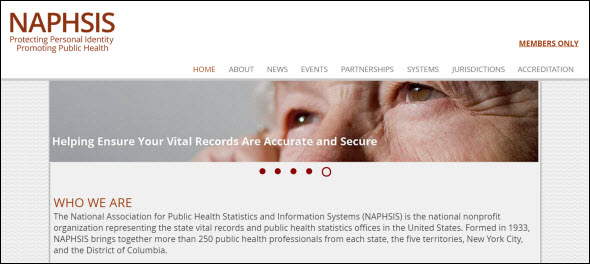Vital records officers changing gears
There is no evidence that closing vital records for long time periods prevents identity theft.
The Legal Genealogist knows that.
You know that.
And now, for the first time, the people in charge of vital records are beginning to acknowledge that.
And that is a Very Good Thing for the genealogical community.
Because access to vital records is critical to all elements of genealogy: not just those of us trying to figure out who our third great grandmother was, but the forensic genealogists trying to repatriate the remains of American servicemen killed in action, and the medical genealogists trying to get a handle on heritable diseases, and…
Yet access to so many vital records is so restricted for such long periods of time, in part because of the theory within a group overseeing vital records that closing records would help limit identity theft.
That’s been the underlying premise of a model law drafted in large part by the National Association for Public Health Statistics and Information Systems (NAPHSIS) that would close birth records for 125 years after the date of birth, marriage records for 100 years after the marriage date, and death records for 75 years after the death date.1

This underlying premise has been contested, vigorously, by the genealogical community — led by the Records Access and Preservation Committee — for years. Every time the model act has been used as the basis for a proposed change in state law, RPAC has been there on behalf of our community working side-by-side with local genealogical groups to say the same thing: There is no evidence that closing vital records for long time periods prevents identity theft.
The particular message RPAC has carried to the states is that closing any records has a negative impact on significant important research and closing death records in particular actually makes identity theft easier. After all, if you can’t easily check whether someone has died, it’s a whole lot easier for the bad guys to use that identity for fraudulent purposes.
This persistent effort by RPAC to share this consistent message appears to be paying off.
As reported in the RPAC blog, there were some very positive developments disclosed at the RPAC session at the 2019 Federation of Genealogical Societies in Washington D.C. just days ago:
“Shawna Webster, Executive Director of the National Association for Public Health Statistics and Information Systems (NAPHSIS) shared the results of a recently completed strategic planning process in which the NAPHSIS Board has made the decision to expand access to data of which developing a new version of the Model State Vital Records Act is a part. The process they envision contemplates a broadly based working group soliciting input from many stakeholders including representatives of the genealogical community.
Her remarks suggest a significant departure from the embargo provision of the 2011 version of the Model Act which would have limited access to birth certificates for 125 years, death certificates for 75 years and marriage and divorce records for 100 years. Shawna specifically acknowledged the absence of statistical data demonstrating that longer embargo periods help thwart identity theft.”2
Let’s repeat that last part again: the executive director of NAPHSIS “specifically acknowledged the absence of statistical data demonstrating that longer embargo periods help thwart identity theft.”
And they’re ready to revisit the whole issue and draft a new model act in consultation with all the affected groups — including the genealogical community.
That’s about the best news records access advocates have had in a month of Sundays.
We can all be grateful to RPAC for its many years of effort in getting us to this point, and to NAPHSIS for continuing to listen to RPAC over all those years.
Now let’s move forward and get access to vital records on a solid footing for everyone.
Cite/link to this post: Judy G. Russell, “Perseverance paying off,” The Legal Genealogist (https://www.legalgenealogist.com/blog : posted 5 Sep 2019).
SOURCES
- See generally §26(c), Model State Vital Statistics Act. ↩
- Fred Moss, “RPAC at FGS 2019 in DC — Is This A Breakthrough?,” RPAC Blog, updated 3 Sep 2019 (https://fgs.org/category/records-preservation-and-access-committee/ : accessed 5 Sep 2019). ↩



We need to find out who funds these folks and their lobbying activities. There web presence is anything but transparent. This group is not a friend to genealogists.
Yay!